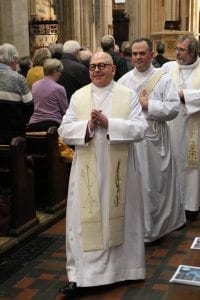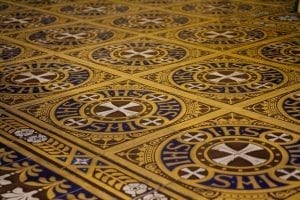 Dear Friends,
Dear Friends,
I believe in God.
I believe in the Scottish Episcopal Church.
I believe in the Diocese of Glasgow and Galloway.
And that is why I have responded to what I believe to be God’s call discerned with and through the College of Bishops, to come to the Diocese of Glasgow and Galloway.
Faithfulness is my strategic plan as I move to the Diocese of Glasgow and Galloway. Faithfulness is an old fashioned word but at the electoral synod meeting, attended by the whole College of Bishops, during the group work it was the word faithfulness, that summarised my experience of that group and the whole electoral process in Glasgow and Galloway.
Faithfulness of the people who turned out for electoral meetings on a Saturday. Faithfulness they described in how, often, small congregations meet on Sundays for worship. Faithfulness they described as their experience of God. Faithfulness of God shown in their yearning to be better disciples of Our Lord Jesus Christ and to live ever more closely with Him. Faithfulness to share their real experience of knowing, feeling, God is with us.
God’s faithfulness to us we see in the life, death, and resurrection of Our Lord Jesus Christ. They crucified Jesus, all that is worst in human nature, jealousy, anger, revenge, certainty, they combined to kill Jesus who showed the full potential of the love in which we recognise the image of God in and with us. The women laid Jesus in the tomb, the place of darkness, failure, disappointment, to prove God is with us in love in our darkest places, whether we recognise that fact or not, even when we feel God is absent and ask “Where is love?”. God is with us in the question, the doubt. Whatever faith is, it is not certainty. Paradoxically, faithfulness teaches us to embrace the questions and the doubts, to have faith in those questions and doubts.
Faithfulness is expressed in our life together as the Scottish Episcopal Church. We have a rich experience of prayer, worship, the sacramental life, intellectual rigour and debate, fearless engagement with culture. Faithfulness has been our experience during the COVID pandemic. The faithfulness of our clergy and laity who have worked so hard to sustain worship, the sacramental life, to prove God is with us, through computers, and tablets, and phones.
Faithfulness to love, to God who is love, as it was in love that we closed the doors of our churches, not in fear of the virus. God is with us, we continue to pray. And as someone famous said, our streets are not empty, they are full of love in small acts of kindness, consideration, generosity and faithfulness.
Perhaps the pandemic has brought us resurrection, we can leave behind the tomb of cynicism. We now recognise that there are nurses and carers who cherish their patients, knowing that their touch may be the last. Doctors who carry their patients in their hearts. Teachers who want their pupils not only to learn but to flourish. Priests who say their prayers and serve others, because they are faithful. The people on the check-outs in our local supermarket faithfully, patiently, explaining that it is not rationing, we are simply being asked to make sure there is enough for all. That is the front line, it is dangerous.
The cynic is the person who is determined never to be disappointed again. Jesus’ resurrection proves God is with us in the tomb of fear, disappointment and loneliness and love bursts out of the tomb of cynicism.
God is with us in Faithfulness. God’s faithfulness to us, which is my experience of God. And our faithfulness to God which is my experience of Glasgow and Galloway.
Faithfulness which I pray I may show to God and to the Diocese through:
- Encouragement, energy and enthusiasm: Faith is so exciting; faithfulness is the Diocesan hallmark, let us encourage each other as I visit congregations and clergy.
- Experience: let us look at our strengths, how do we, have we, will we, experience God. Let us move nearer to God together in faithfulness to God and one another.
- Effecting: Building the Kingdom of God through faithfulness is our aim and our purpose. That means we do not focus on age, numbers of people in church, money, or lack of it. We will build the Kingdom of God, who is love, through faithfulness. We will build and grow because God is with us. We will all be able to say when asked why we go to church, faithfulness will say: “Because there I have an experience of the living God.”


